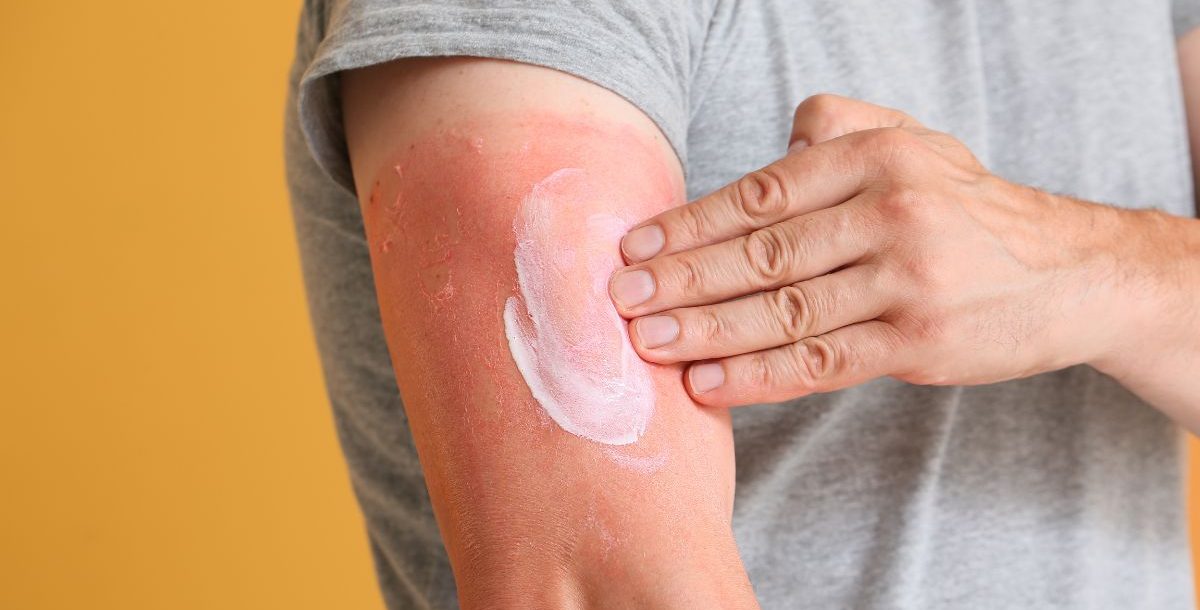Summer is a time for outdoor adventures, beach trips and basking in the warm sunshine. However, excessive sun exposure can lead to sunburn, an all-too-common skin condition. How long do sunburns last, and how can you manage them effectively?
What is a sunburn?
Sunburn is your skin’s response to excessive ultraviolet (UV) radiation, primarily from the sun. The UV rays from the sun damage the DNA in skin cells. This can lead to symptoms such as inflammation, redness and pain. In severe cases, it can cause blistering and peeling. And each sunburn you get raises your risk of developing skin cancer.
How long do sunburns last?
How long a sunburn lasts and the proper treatment for it depends on its severity.
Mild sunburn
- Symptoms: Redness, slight pain and sensitivity to touch.
- Duration: Typically lasts three to five days.
- Healing process: The skin may start to peel after a few days as the body sheds damaged skin.
Moderate sunburn
- Symptoms: Intense redness, swelling, pain and blistering.
- Duration: Can last up to a week.
- Healing process: You might develop blisters within 24 to 48 hours and peeling skin is more pronounced. Pain and swelling can continue for several days.
Severe sunburn
- Symptoms: Deep redness, severe pain, significant swelling, large blisters and other symptoms like fever, chills, nausea and dehydration.
- Duration: Healing can take more than a week, sometimes up to two weeks.
- Healing process: Severe sunburns can be second- or even third-degree burns. You might need to see a medical professional to help with pain, prevent an infection and help the healing process.
What affects how long a sunburn lasts?
Several factors can influence how long a sunburn lasts, including:
- Skin type and condition: People with fair skin are more prone to severe sunburns that can take longer to heal.
- Extent of UV exposure: Spending more time exposed to UV radiation increases the severity and duration of sunburn.
- Immediate care: Quick and proper care can significantly reduce how long it takes for your sunburn to heal.
Treating a sunburn
Managing your sunburn properly can help you ease symptoms and heal quicker.
- Hydration: Drink plenty of water to prevent dehydration and support skin healing.
- Cool compresses: Apply cool (not cold) compresses to the affected area to reduce heat and pain.
- Moisturize: Use aloe vera or a gentle moisturizer to soothe the skin and prevent dryness and peeling. Using hydrocortisone cream reduces inflammation and itching that can accompany a sunburn.
- Pain relief: Over-the-counter pain relievers like ibuprofen or acetaminophen can help with pain and reduce inflammation.
- Avoid further sun exposure: Stay out of the sun until your sunburn has healed to prevent it from worsening.
When should you see a doctor for a sunburn?
While most sunburns can be managed at home, certain signs indicate the need for medical attention, including:
- Severe blistering over a large area.
- Intense pain and swelling.
- Signs of infection (e.g., increased redness, pus, red streaks).
- Symptoms like fever, chills, nausea or confusion.
Preventing a sunburn
The best way to deal with sunburn is to prevent it in the first place. Here are some key prevention tips:
- Use sunscreen: Apply a broad-spectrum sunscreen with an SPF of at least 30. Reapply every two hours and after swimming or sweating. However, it is not recommended for children 6 months or younger to wear sunscreen and should be kept out of the sun.
- Seek shade: Shade is the best sun protection. Stay in the shade, especially during peak sun hours from 10 a.m. to 4 p.m.
- Wear sun-protective clothing: Long sleeves, wide-brimmed hats and sunglasses provide additional protection.
How we can help
Sunburns, while common, can cause significant discomfort and skin damage. However, it’s nearly impossible to avoid the sun entirely. The best way to stay aware of your skin’s health is to see a dermatologist. Getting regular skin checks can help you catch any skin cancers early.
And if you do get a sunburn that requires medical care, visit a nearby urgent care or emergency department to have a health care professional treat you quickly.
Learn about the urgent care and emergency care services we offer at Bon Secours.





